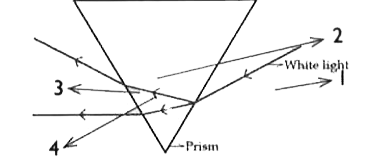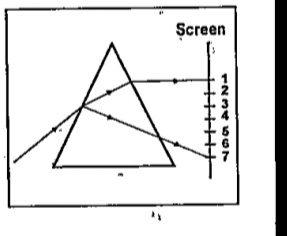When a beam of white light is passed through a triangular glass prism, it gets dispersed into its seven colour components. Why do we get these colours ? In the given figure, the colours 3 and 4 represent the extreme components of the spectrum. Identify 3 and 4.
 Solution in Kannada
Solution in Kannada
(i) Different colours of light travel with different speeds while passing through a prism. Hence, they are bent at different angles with respect to the incident ray. This leads to the dispersion of light.
(ii) X = violet, Y = red.
Topper's Solved these Questions
- THE HUMAN EYE AND THE COLOURFUL WORLDBOOK - ZEN PUBLICATIONCHAPTER - THE HUMAN EYE AND THE COLOURFUL WORLDEXERCISE - ZEN ADDITIONAL QUESTIONS SECTION - SHORT ANSWER TYPE QUESTIONS - II
28 Videos
- THE HUMAN EYE AND THE COLOURFUL WORLDBOOK - ZEN PUBLICATIONCHAPTER - THE HUMAN EYE AND THE COLOURFUL WORLDEXERCISE - ZEN ADDITIONAL QUESTIONS SECTION - Problem Section
36 Videos
- THE HUMAN EYE AND THE COLOURFUL WORLDBOOK - ZEN PUBLICATIONCHAPTER - THE HUMAN EYE AND THE COLOURFUL WORLDEXERCISE - ZEN ADDITIONAL QUESTIONS SECTION - VERY SHORT ANSWER TYPE QUESTIONS
97 Videos
- SOURCES OF ENERGYBOOK - ZEN PUBLICATIONCHAPTER - SOURCES OF ENERGYEXERCISE - ZEN ADDITIONAL QUESTIONS SECTION (HIGHER-ORDER THINKING SKILLS [HOTS] )
14 Videos
Similar Questions
Draw a labelled diagram of the human eye. What is the significance of the blind spot ?
View SolutionCalculate maximum power of accomodation of a person having normal vision.
View SolutionWhat is cornea ?
View SolutionState the areas where acid rains are most likely.
View SolutionWhat is a spectrum ? Why do we get a spectrum of seven when while light is dispersed by a prism ?
OR
Explain how a spectrum is formed.
View SolutionWhen a beam of white light passes through a glass prism, it splits up into seven colours. This phenomenon is due to
View SolutionWhy do we get colours when white light passes through a prism ?
View SolutionWhen a beam of white light is passed through a triangular glass prism, it gets dispersed into its seven colour components. Why do we get these colours ? In the given figure, the colours 3 and 4 represent the extreme components of the spectrum. Identify 3 and 4.
View SolutionWhy do different colours get separated when a white light passes through a prism ? How can we recombine the components of white light after a prism has separated them ? Explain with the help of a figure.
View SolutionWhy do different colours get separated when white light passes through a prism? How can we recombine the components of white light after a prism has separated them. Explain.
View SolutionDefine angle of deviation. Why do different components of white light split up into spectrum when it passes through a triangular glass prism? Show the angle of deviation for red colour when white light passes through a prism.
View SolutionWhy do we get different colours in the phenomenon of dispersion of white light through prism?
View SolutionWhen a beam of white light is passed through a triangular glass prism, it gets dispersed into its component colours. Why do we get these colours ? In the given figure, the colours X and Y represent the extreme components of the spectrum. Identify X and Y.
View SolutionWhy do the seven-colour components of white light bend through different an with respect to the incident beam of light after passing' through a prism?
View SolutionA narrow beam of white light passes through a triangular glass prism and gets split up into seven colours marked 1 to 7. Which two positions correspond closely to the colour of: potassium permanganate?
View SolutionA narrow beam of white light passes through a triangular glass prism and gets split up into seven colours marked 1 to 7.
Which two positions correspond closely to the colour of:
'danger' or 'stop signal lights'?
View Solution
